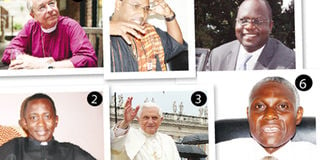Prime
Scandals that rocked the church this year

1. The openly gay Bishop Gene Robinson of New Hampshire was elected in 2003.
2. In March this year, self-confessed former homosexuals accused the renowned Catholic priest, Fr. Anthony Musaala, of being a homosexual.
3. Pope Benedict XV1 welcomed disgruntled Anglicans to the Catholic faith and caused an uproar in the Anglican Church.
4. Pastor Martin Sempa, along with pastors Solomon Male (6) Michael Kyazze (5) and Bob Kayiira, accused fellow Pastor Robert Kayanja of sodomy and proceeded to take him to court.
Never before has the church faced such turmoil and scandal. This year, the house of God battled homosexuality, increase in gay leadership and child abuse among others , writes Edwin Nuwagaba
The year 2009 has ended. But like past years, a number of scandals in the church made headlines. Topping the list was homosexuality, which devoured the church so much that it almost tore up the Anglican sect. Right now, the Anglican Church is still divided on issues of consecration of women bishops and same sex clergy.
Let’s start at home. The popular Pastor Robert Kayanja was accused by fellow pastors - Martin Sempa, Solomon Male and Bob Kayiira, of sodomising two boys. Kayanja said he was being accused falsely. The victims were Samson Mukisa and David Mukalazi. Amidst investigations, the police said the two victims had retracted their statements, but the victims denied this. Even if he was on the front page of every newspaper, Pastor Kayanja still preached at his church with resilience as he comforted his congregation, saying that he was only being witchhunted. The evangelical pastor has since moved on.
In March this year, self-confessed former homosexuals accused the renowned Catholic priest, Fr. Anthony Musaala, of being a homosexual. Paul Kagaba, who said he was a homosexual for eight years, told a press conference in Kampala that Musaala, a gospel music award-winner, regularly held parties for gays at his residence in Gayaza near Kampala. To add salt to injury, Musaala’s boy-band members accused him of sodomising them, creating a furore around the once popular priest. Police and church investigations into the case fizzled out but not before Musaala was given a special set of rules to abide by from the Catholic Church, among them curfew.
In the Anglican faith, when a bishop hits 65, they have to retire from the service, but Bishop Samuel Balagadde Ssekadde did not want to retire. And what would Archbishop Luke Orombi have done but order him to hand over the Episcopal jurisdiction of Namirembe Diocese and abdicate as bishop? Sekadde had been bishop at Namirembe for 16 years. He had hit 65 years of age and some Christians felt it was not right for him to keep the office. And worse still, he was being accused of mismanaging the diocese affairs. Ultimately, the House of Bishops elected Wilberforce Kityo Luwalira as the new bishop.
While Ssekadde was seemingly refusing to give up office in Uganda, the Anglican Communion, having faced opposition from the Gafcon bishops in 2008 on the way the church was dealing with homosexuality issues, was faced with yet another big scandal.
Having elected the openly gay Bishop Gene Robinson of New Hampshire in 2003, the Anglican Church this year almost split over the election of a lesbian Episcopal bishop, 55-year-old Rev. Mary Douglas Glasspool. The election of the lesbian bishop raised very serious questions about the Episcopal Church and its position in the Anglican Communion. Glasspool has lived with the same female partner since 1988.
And now with conservative Anglican bishops from Africa like Orombi and Nigeria’s Archbishop Peter Akinola opposed to the gay bishops, one can only wonder whether Canterbury still has influence on the entire Anglican fraternity - which already has elements threatening to break away. Conservative Africans are bitter that new trends and culture are penetrating and breaking the traditional ideals of the Anglican Communion.
Times reported recently that the influential American Anglican Council was among the first of the conservative bodies to condemn the latest election, accusing the Episcopal Church of a further departure from biblical teaching.
Amidst the Anglican Church’s troubles, Pope Benedict XV1 said that he was ready to welcome the disgruntled members of the Anglican Communion to the Catholic faith. Was this mockery or it was simply taking advantage of the situation? These were questions from sceptics about whether the two faiths could once again be reunited.
But the Catholic Church also found herself in a tight spot when she was exposed in the Murphy Report for failure to handle child abuse and subsequent cover-ups by the church hierarchy. The report was published in Ireland and stated that church authorities in Dublin covered up child sexual abuse until the mid 1990s. The problem was these clerics had known that the priests had raped children for decades but chosen to protect them.
They did not tell the police, ignored the cries of the children and parents and moved the guilty paedophile priests to “safer” parishes, burying their scandals. The three-volume report found that the “maintenance of secrecy, the avoidance of scandal, the protection of the reputation of the church and the preservation of its assets” were prioritised over justice for the victims. In this incidence, a fifth high-ranking cleric, Limerick Bishop Donal Murray, stood down after he was singled out for mishandling allegations against an abusive cleric.
Meanwhile the Church of Sweden this year was shaken by a number of sex scandals which saw Archbishop Anders Wejryd come out to regret the incidents. In April, the diocese boards in Stockholm, Växjö and Lund had to address several sex-related incidents including a priest who slept with a grieving widow, another who maintained an inappropriate relationship with a 15-year-old and a third who hurled abuse at women on an internet dating site.
We ought to get onto our knees and pray, because no one knows how tomorrow will be, though it looks like we shall wake up to 2010 still facing challenges of whether to allow same sex marriages in church, or whether we should have women bishops and whether to break away from the Anglican Communion.




